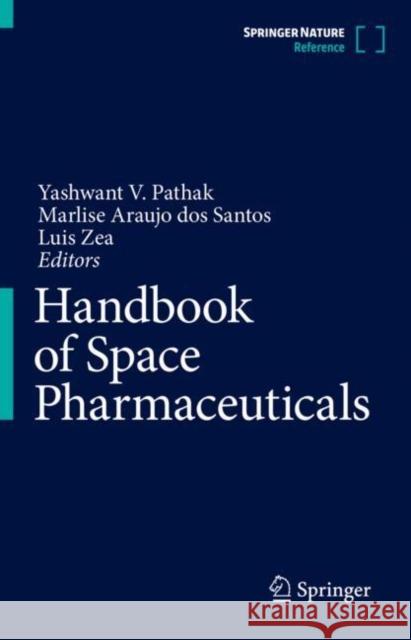Handbook of Space Pharmaceuticals » książka



Handbook of Space Pharmaceuticals
ISBN-13: 9783030055257 / Angielski / Twarda / 2022 / 1800 str.
Handbook of Space Pharmaceuticals
ISBN-13: 9783030055257 / Angielski / Twarda / 2022 / 1800 str.
(netto: 2875,46 VAT: 5%)
Najniższa cena z 30 dni: 2698,88
ok. 16-18 dni roboczych.
Darmowa dostawa!
Section I: Principles of Pharmaceuticals.- Section II: Effects of Spaceflight on Human Physiology and its Consequences on Drug Treatment.- Section III: Model Organisms for Pharmaceutical Research in Space.- Section IV: Simulated Microgravity for Pharmaceutical Research.- Section V: Translating Knowledge from Spaceflight Research to Earth Applications.- Section VI: Nutritional and Alternative Approaches to Treatment in Space.
Dr. Yashwant V. Pathak has over 13 years of versatile administrative experience in an Institution of Higher Education as Dean (and over 30 years as faculty and as a researcher in higher education after his Ph.D.) and now holds the position for Associate Dean for Faculty Affairs and tenured Professor of Pharmaceutical Sciences. Dr. Pathak is an internationally recognized scholar, researcher, and educator in the areas of healthcare education, nanotechnology, drug delivery systems, and nutraceuticals. His major achievements from 2015 to 2020 in international area include:
1. Fulbright Senior Scholar Core Fellowship Award 2015–2016 for Indonesia (visiting Ubaya University, Surabaya, Indonesia, from January till July 2017)
2. Endeavour Executive Fellowship by Australian Government in 2015 in collaboration with Deakin University to work on siRNA delivery
3. Prometeo Fellowship award from Ecuador Government, 2015
4. CNPQ Brazil Government Fellowship, visiting PUCRS in Porto Alegre every year for one month from 2015 till 2017 working on space pharmaceuticals and microgravity impact on stability of drug delivery systems
5. Outstanding Achievement Award for Global Engagement by the University of South Florida, a unique award given to only one faculty/administrator annually
6. Fellow of NSF I-Corps USF 2016
7. Outstanding Faculty Award from USF March 2017
8. Fulbright Specialist Fellowship 2019 for South Africa
9. Outstanding Faculty Award from the University of South Florida 2020
10. Elected as fellow of American Association for the Advancement of Sciences (FAAAS) in 2021
He has published extensively with over 50 edited volumes in the area of nanotechnology, drug delivery systems, artificial neural networks, conflict management, and cultural studies. Elsevier, John Wiley and Sons, Springer, Taylor and Francis, and many other international publishers publish his books. He has published over 300 research papers, reviews, and chapters in the books and presented in many national and international conferences. He is also actively involved in many nonprofit organizations, to mention a few, Hindu Swayamsevak Sangh, USA, Sewa International USA, International Accreditation Council for Dharma Schools and Colleges, International Commission for Human Rights and Religious Freedom, and many more.
Dr. Marlise Araújo dos Santos holds a degree in Pharmacy from the Federal University of Rio Grande do Sul (1988), a Master's in Pharmacy from the Federal University of Rio Grande do Sul (1993) and a Ph.D. in Drug Delivery and Absorption where she worked in development of formulating a nasal formulation for Space Motion Sickness and a system to assess the permeability of drugs in cells grown in simulated microgravity - Kings College London University of London (2006). She coordinated the Joan Vernikos Aerospace Pharmacy Laboratory at PUCRS for 10 years. She has 21 years of research experience in Aerospace Pharmacy, working mainly on the following topics: simulated hypergravity, simulated microgravity, involving cell culture, drug synthesis, medicinal plants and pharmaceutical technology (nanotechnology). She is the Board of Advisor Member for Aerospace Pharmacy and Telepharmacy at the British company InnovaSpace Space without Borders (https://www.innovaspace.org/). She holds 3 patents in the area, author of several scientific articles and two international awards. She gives lectures and courses in the Aerospace Pharmacy area at universities and conferences in different countries (India, Portugal, Trinidad Tobago, United States, Italy, Poland, Germany, Turkey, Romania). She is a member of the Space 4 Women international group, part of the Space & Extreme Environment Research Center at UFCSPA (https://spacecenterufcspa.org/). She is a volunteer evaluator for NASA postdoctoral projects in the area of Space Life Science. She is a Member of the International Society for Telemedicine and eHealth and Founder of the MyDigicare, a startup that provides remote pharmaceutical care, an area that she has 10 years of experience.
Dr. Luis Zea is an aerospace engineer and gravitational microbiology scientist who has been fortunate of having worked on over twenty scientific experiments performed on the Space Shuttle and/or the International Space Station and has served as Principal Investigator of projects going to lower Earth orbit and on an upcoming mission around the Moon, in NASA's Artemis I mission. His scientific work is based on the use of microgravity to find novel solutions to medical problems on Earth as well as to enable safe, long-term human spaceflight, including via biological in situ resource utilization. Luis served as the Co-Director of Guatemala’s first satellite, Quetzal-1, an Universidad del Valle de Guatemala student- and faculty-developed CubeSat. He has seen first-hand the benefits that space research & development has on societies, for which he is passionate of the democratization of access to space for peaceful purposes, international collaboration, and the academic preparation of the next generation.1997-2026 DolnySlask.com Agencja Internetowa
KrainaKsiazek.PL - Księgarnia Internetowa









